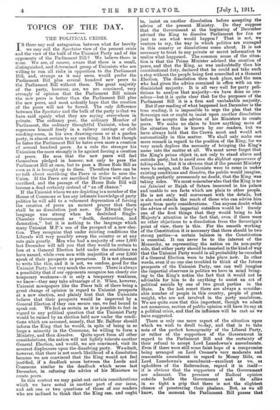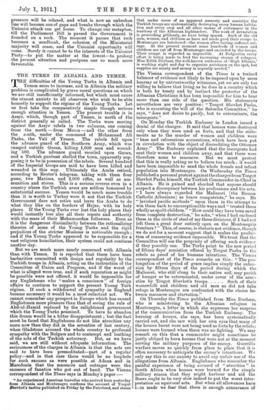TOPICS OF THE DAY.
THE POLITICAL CRISIS.
IS there auy real antagonism between what for brevity we may call the Spectator view of the present crisis and the view of the bulk of the Unionist Party and of the opponents of the Parliament Bill ? We believe there is none. We are, of course, aware that there is a small, distinguished, and determined group of Unionists who are willing to run all risks in opposition to the Parliament Bill, and, strange as it may seem, would prefer the Parliament Bill plus several hundred new peers to the Parliament Bill without them. The great majority of the party, however, are, we are convinced, very strongly of opinion that the Parliament Bill minus the new peers is better than the Parliament Bill plus the new peers, and most ardently hope that the creation of the peers will not be forced. The only difference between the Spectator and the bulk of the party is that we have said openly what they are saying everywhere in private. The ordinary peer, the ordinary Member of Parliament, the ordinary thoughtful Unionist, when he expresses himself freely in a railway carriage or club smoking-room, in his own drawing-room or at a garden party, is almost certain to say one thing. It is that though he hates the Parliament Bill-he hates even more a creation of several hundred peers. As a, rule the stronger his Unionism the more strongly is he against forcing a creation of peers. He sees that the new peers will feel themselves pledged in honour, not only to pass the Parliament Bill at once, but to pass a Home Rule Bill as soon as it is brought up to them. Therefore there can be no talk about sacrificing the Peers in order to save the Union. If the Peers are sacrificed the Union will also be sacrificed, and the passage of the Home Rule Bill will become a dead certainty instead of " an off chance."
If the Unionist whom we are depicting is a member of the House of Commons or has any intimate knowledge of party politics he will add to a vehement deprecation of forcing the creation of peers an earnest prayer that there shall be no dissolution just now. Sir Edward Grey's language was strong when he desCribed Single- Chamber Government as " death, destruction, and damnation," but it is nothing to the language which many Unionist M.P.'s use of the prospect of a new elec- tion. They recognize that under existing conditions the Liberals will very possibly sweep the country or at any rate gain greatly. Men who had a majority of over 1,000 last December will tell you that they would be certain to lose at a General Election held under the conditions we have named, while even men with majorities of over 2,000 speak of their prospects as precarious. It is not pleasant to write like this, and it is not, we confess, good for the Unionist Party, but very much the reverse. There is always a possibility that if our opponents recognize too clearly our temporary weakness—it is only a temporary weakness, we know—they may take advantage of it. When, however, Unionist newspapers like the Times talk of there being a great change of opinion in regard to Unionist prospects at a new election, and plainly hint that the Unionists believe that their prospects would be improved by a General Election if they can secure one, we feel bound to speak out. We feel as certain as it is possible to feel in regard to any political question that the Unionist Party would be ruined by an election held now under the condi- tions which are assumed, namely, that Mr. Balfour should inform the King that he would, in spite of being in so large a minority in the Commons, be willing to form a Ministry, and then dissolve. Quite apart from all other considerations, the nation will not lightly tolerate another General Election, and would, we are convinced, visit its severest displeasure upon the dissolving party. We admit, however, that there is not much likelihood of a dissolution because we are convinced that the King would not feel justified, if a deadlock arose between the Lords and Commons similar to the deadlock which arose last December, in refusing the advice of his Ministers to create peers. In this context we may point out certain considerations which we have noted in another part of our issue, and ask one or two questions of those of our readers who are inclined to think that the- King can, and ought to, insist on another dissolution before accepting the advice of the present Ministry. Do they suppose- that the Government at the beginning of December advised the King to dissolve Parliament for fun or just to see what would happen ? That is not, we venture to say, the way in which politics are managed in this country or dissolutions come about. It is not necessary to trust to any private or secret information to realize what happened. The common sense of the situa- tion is that the Prime Minister advised the creation of peers, and that the King, as was undoubtedly then his constitutional duty, declared that he could not take such a step without the people being first consulted at a General Election. The dissolution then took place, and the men who had given the advice remained in office with an un-. diminished majority. It is all very well for party poli- ticians to analyse that majority—we have done so our- selves—but it is quite clear that for the purposes of the Parliament Bill it is a firm and unshakable majority.
But if our reading of what happened last December is the true reading, it is impossible to urge the plea that the Sovereign can or ought to insist upon another dissolution before he accepts the advice of his Ministers to create peers. We make no claim to know anything more of the situation than is known by our readers, but we have• always held that the Crown must and would act automatically in this matter. We shall only make one more remark in regard to the position of the King, for we very much deplore the necessity of bringing the King's name into the matter at all. We must never forget that the King's prime object is, not only to stand above and outside party, but to avoid even the slightest appearance of taking sides. But it is obvious that if the present Ministry were to resign, and the Unionists were to come in under existing conditions and dissolve, the public would imagine, though perfectly erroneously no doubt, that the King was taking sides. We must remember also that the King is no mt faineant or Rajah of Satara immured in his palace and unable to see facts which are plain to other people. He is not only well conversant with the details, but is also not outside the reach of those who can advise him apart from party considerations. Can anyone doubt what the advice of such impartial outsiders would be ? Surely one of the first things that they would bring to hie Majesty's attention is the fact that, even if there were no other objections to a dissolution from the Sovereign's point of view, there is this. For the smooth working of the Constitution it is necessary that there should be two strong parties—a certain balance in the Constitution is essential. It can never be to the interest of the Monarchy, as representing the nation on its non-party side, that either party should be smashed in the kind of way that the Unionist Party would in all probability be smashed if a General Election were to take place now. In other words, even if no one else troubled to think of the future- prospects of the Unionist Party, one can well imagine the impartial observers in politics we have in mind b ing to the King's notice the fact that it would not be advisable for him to do anything to assist an act of political suicide by one of two great parties in the State. In the last resort there are always a consider- able number of people in this country, people of great weight, who are not involved in the party maelstrom. We are quite sure that this important, though we admit not numerous, section of public opinion will have its say at a political crisis, and that its influence will be cast as we have suggested.
There is only one more aspect of the situation upon which we wish to dwell to-day, and that is to take note of the perfect homogeneity of the Liberal Party, or rather of the supporters of the Government in regard to the Parliament Bill and the certainty of their refusal to accept Lord Lansdowne's amendments. Even if there were still some faint hope of a compromise being arranged on Lord Cromer's very moderate and reasonable amendment in regard to Money Bills, on Lord Lansdowne's amendment—excellent as we, as upholders of the Referendum, regard it in itself— it is obvious that the supporters of the Government areadamant. The pressure of Radical opinion outside holds the Government and its allies in so tight a grip that there is not the slightest chance of penetrating their phalanx. But, as we all know, the moment the Parliament Bill passes that pressure will be relaxed, and what is now an unbroken line will become one of gaps and breaks through which the Unionist attack can get home. To change our metaphor, till the Parliament Bill is passed. the Government is founded on a rock. The moment it passes that rock becomes a sandbank, the cohesion of the Ministerial majority will cease, and the Unionist opportunity will come. Surely it cannot be to the interests of the Unionist Party—to put the matter at the lowest—to prolong the present situation and postpone one so much more favourable.















































 Previous page
Previous page